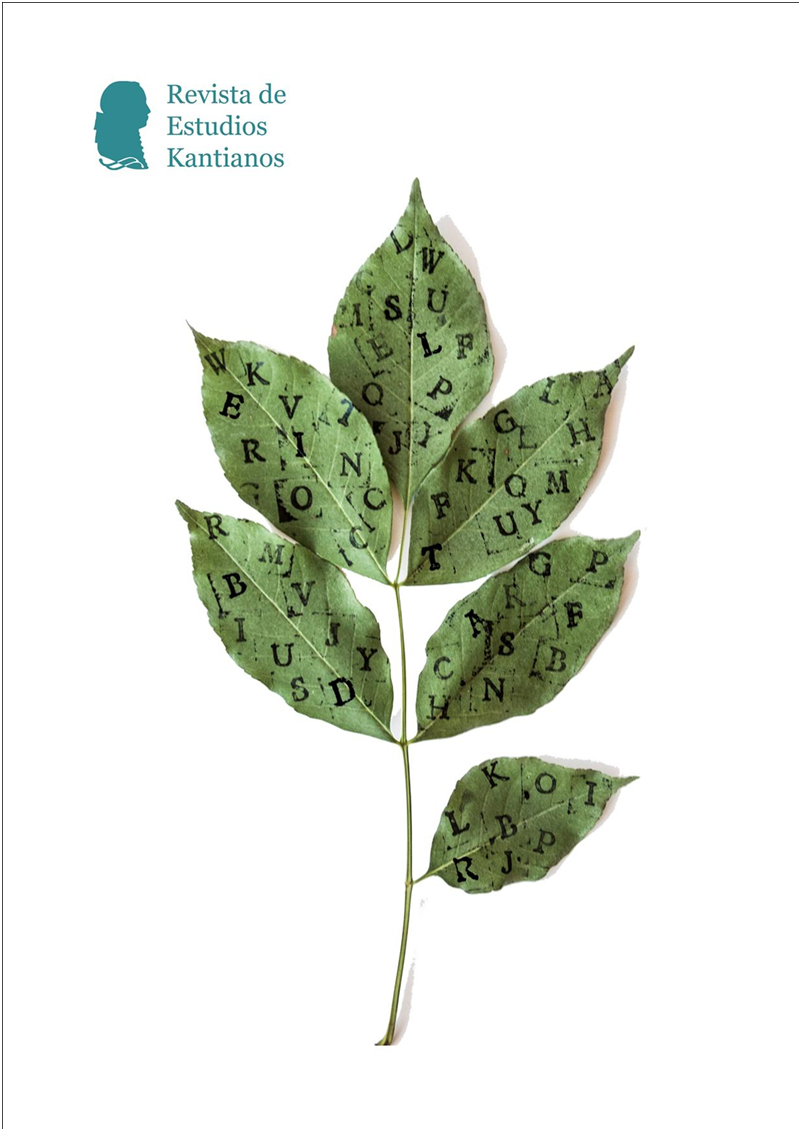Plotinus’ concept of ‘We’ and Its Relation to the Kantian Tradition
DOI:
https://doi.org/10.7203/REK.9.1.27679Palabras clave:
Plotinus, History of Philosophy, Self-consciousness, Neoplatonism, Kantian Tradition Resumen
Resumen
Hailed as an innovative concept in antiquity, Plotinus’ concept of the ‘we’ occupies a nuanced and somewhat elusive systematic position. On the one hand, it locates itself in the realm of the soul rather than the intellect; at the same time, however, it manifests a self-conscious dimension typically ascribed to the intellect rather than the soul. This paper attempts to resolve this ambiguity by interpreting the ‘we’ as a potential of self-consciousness, which explains why the ‘we’ can become similar to, but not identical with, the actual self-consciousness of the intellect. The proposed definition not only brings clarity to the seemingly paradoxical formulations surrounding the ‘we’ in Plotinus’ philosophy but also sheds light on the allegories that Plotinus employs. Moreover, my analysis highlights the similarity between the Plotinian ‘we’ and the characterizations of the self within the Kantian tradition. Drawing on Cassirer’s dichotomy between concepts of substance and concepts of function, and Kant’s assertion that the ‘I think’ represents a potentiality rather than an actuality of self-consciousness, this study attempts to provide a conceptual bridge between the Plotinian and Kantian frameworks.
 Descargas
Descargas
 Citas
Citas
Armstrong, A. H. ed. (1966-1988), Plotinus: Enneads. Cambridge: Harvard University Press.
Aubry, G. (2020). An Alternative to Cartesianism? Plotinus’s Self and its Posterity, Pages 210-230 of: Cudworthand, Ralph (ed.), Self-Knowledge in Ancient Philosophy, Oxford : Oxford University Press.
Beierwaltes, W. (1991). Selbsterkenntnis und Erfahrung der Einheit: Plotins Enneade V 3: Text, Übersetzung, Interpretation, Erläuterungen. Frankfurt am Main: Vittorio Klostermann.
Blumenthal, H. J. (1971). Plotinus’ Psychology: His Doctrines of the Embodied Soul, The Hague: M. Nijhoff.
Bréhier, E. (1928). Histoire de la philosophie. Paris: Presses Universitaires de France.
Cassirer, E. (1923). Substanzbegriff und Funktionsbegriff: Untersuchungen über die Grundfragen der Erkentniskritik. Berlin: B. Cassirer.
Dodds, E. R. (1960). Comment on H. R. Schwyzer: ‘Bewusst’ und ‘unbewusst’ bei Plotin. Pages 385–386 of: Dodds, Eric R. (ed.), Les Sources de Plotin. Geneve: Fondation Hardt.
Hutchinson, D. M. (2018). Plotinus on Consciousness. Cambridge University Press.
Kalligas, P. 2014. The Enneads of Plotinus, Volume 1: A Commentary. Vol. 1. Princeton: Princeton University Press.
Kant, I. (1956). Kritik der reinen Vernunft B, Hamburg: Meiner
Mortley, R. (2013). Plotinus, Self and the World. Cambridge: Cambridge University Press.
O’Daly, G. (1973). Plotinus' Philosophy of the Self, New York: Barnes & Noble.
Oosthout, H. (1991). Modes of Knowledge and the Transcendental: An Introduction to Plotinus Ennead 5.3 [49]. Amsterdam: John Benjamins Publishing.
Rappe, S. (1996). Self-knowledge and Subjectivity in the Enneads. Pages 250-274 of: Gerson, Lloyd (ed.), The Cambridge Companion to Plotinus, Cambridge: Cambridge University Press, 1996.
Remes, P. (2007). Plotinus on Self: The Philosophy of the ‘We’. Cambridge: Cambridge University Press
Schwyzer, H. R. (1960). “Bewusst” und “Unbewusst” bei Plotin, Pages 343-378 of: Dodds, Eric R. (ed.), Les Sources de Plotin. Geneve: Fondation Hardt.
Sorabji R., (2006). Self: Ancient and Modern Insights about Individuality, Life, and Death, Oxford: Clarendon Press.
Stenzel, J. (1929). Metaphysik des Altertums München: R. Oldenbourg.
Tornau, C. (2009). What’s a Person? Unity, Individuality And Self-Consciousness in the Plotinian Metaphysics of the Soul. Les Études Philosophiques, 332–360.
Warren, E. W. (1964). “Consciousness in Plotinus.” Phronesis 9.2, 83-97
Descargas
Publicado
Cómo citar
-
Resumen153
-
PDF 43
Número
Sección
Licencia
![]()
Los autores que publican en esta revista están de acuerdo con los siguientes términos:
- Los autores conservan los derechos de autor y garantizan a la revista el derecho de ser la primera publicación del trabajo al igual que licenciado bajo una Creative Commons Attribution License que permite a otros compartir el trabajo con un reconocimiento de la autoría del trabajo y la publicación inicial en esta revista.
- Los autores pueden establecer por separado acuerdos adicionales para la distribución no exclusiva de la versión de la obra publicada en la revista (por ejemplo, situarlo en un repositorio institucional o publicarlo en un libro), con un reconocimiento de su publicación inicial en esta revista.
- Se permite y se anima a los autores a difundir sus trabajos electrónicamente (por ejemplo, en repositorios institucionales o en su propio sitio web) antes y durante el proceso de envío, ya que puede dar lugar a intercambios productivos, así como a una citación más temprana y mayor de los trabajos publicados (Véase The Effect of Open Access) (en inglés).








